Build Back Better: A visit from U.S. Labor Secretary Marty Walsh
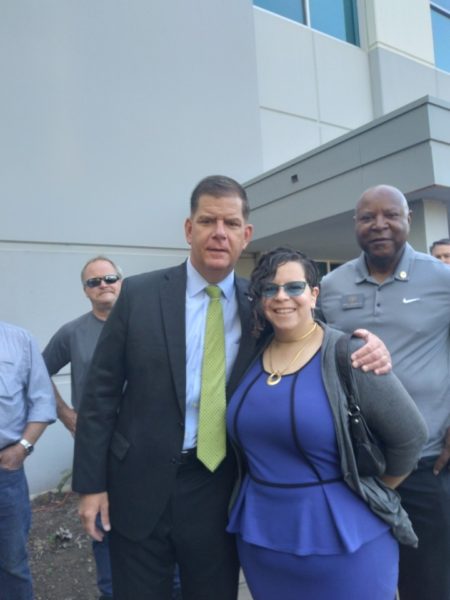
U.S. Labor Secretary Marty Walsh with Oregon Tradeswomen graduate Leslie Cotton
On Tuesday, August 10, 2021, U.S. Labor Secretary Marty Walsh visited Oregon and came to the UA Local 290 Springfield Training Center to talk about the Biden administration’s #BuildBackBetter plan and the goal of building an inclusive, worker-centered economy.
Secretary Walsh was joined by Representative Peter DeFazio, Oregon Labor Commissioner, Val Hoyle, and other labor leaders around the state. Together, they discussed the pending infrastructure bill and how the Biden administration plans to invest in apprenticeship and advancements for workforce equity.
The same day, the U.S. Senate passed a bipartisan physical infrastructure bill including substantive investments in roads, bridges, rail, transit, and utilities. The amendment for workforce equity which would increase access for women and people of color on infrastructure construction jobs was not included in the final bill.
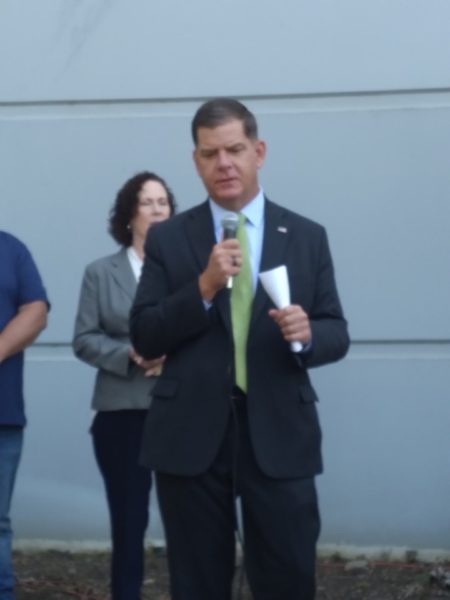
Oregon Labor Commissioner Val Hoyle listens to U.S. Department of Labor Secretary Marty Walsh
Our tradeswomen community will continue to work for equitable access and opportunities for women and people of color in the construction industry and is so appreciative of the Labor Secretary’s visit to advocate for registered apprenticeship, pre-apprenticeship, and infrastructure investments to benefit all workers. When asked by Oregon Tradeswomen’s Executive Director, Kelly Kupcak, about his leadership at the U.S. Department of Labor, he outlined a comprehensive commitment to all workers, migrants, women, disabled persons, veterans, and BIPOC. He concluded by saying “Equity is in my DNA”.
Oregon Tradeswomen is grateful for Secretary Walsh’s leadership and his dedication to equity and fighting for worker dignity on the front lines.
Workforce Partner Spotlight: Streimer Sheet Metal
When Oregon Tradeswomen’s founders came together, the idea of women working in the construction trades was a radical idea. While we are still on the road to a construction workforce with an equal representation of women and men on the job-site, the face of the construction industry is definitely changing.
Much of this shift is a result of the commitment of Oregon Tradeswomen’s Workforce Partners who empower our organization to continue giving women the tools to succeed and who embrace our mission to increase women’s participation on job sites across our region. We are grateful to Workforce Partners like Streimer Sheet Metal who have made an active effort to hire women, including a number of Oregon Tradeswomen graduates.
We spoke with Streimer Sheet Metal’s HR Manager, Teresa Bergan, about why they support Oregon Tradeswomen as a Workforce Partner. Teresa explained, “Streimer supports Oregon Tradeswomen because learning a trade is an educational pathway to a great career choice that raises women above the everyday career. Streimer supports and partners with Oregon Tradeswomen to train women who are looking for a career in the sheet metal craft. Those graduates become employees that become a voice and an ambassador of Streimers’ dedication to excellence and professionalism in the construction industry.”
Oregon Tradeswomen is grateful for Streimer’s commitment to the tradeswomen movement, and their positive impact on the industry. We invite you to meet some of the incredible tradeswomen on their team:
Meet the Women of Streimer Sheet Metal:
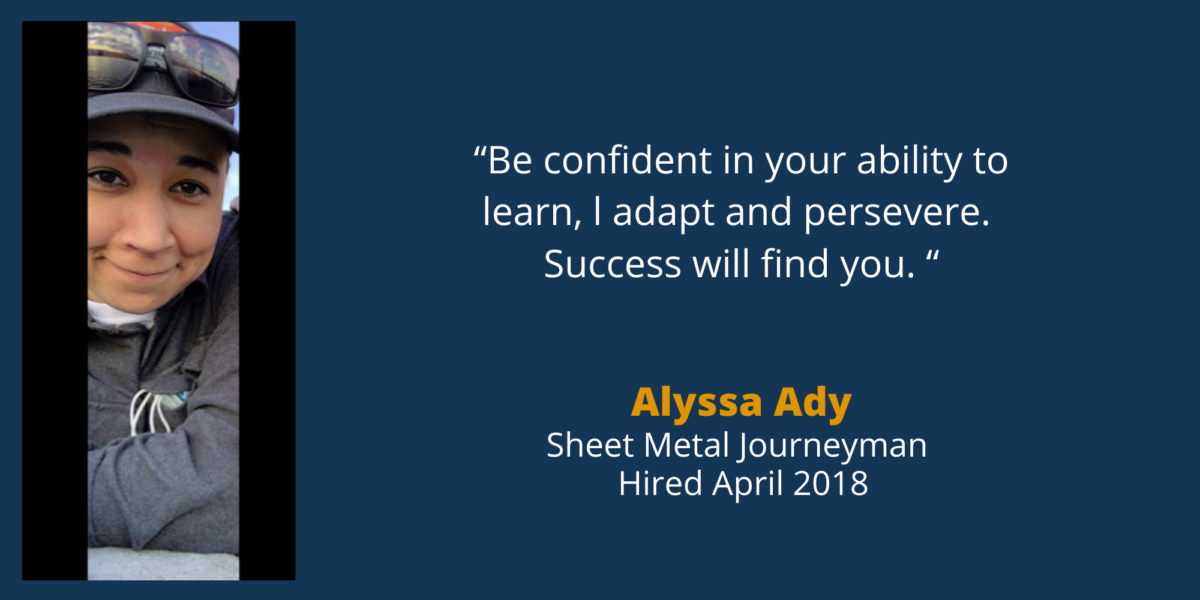
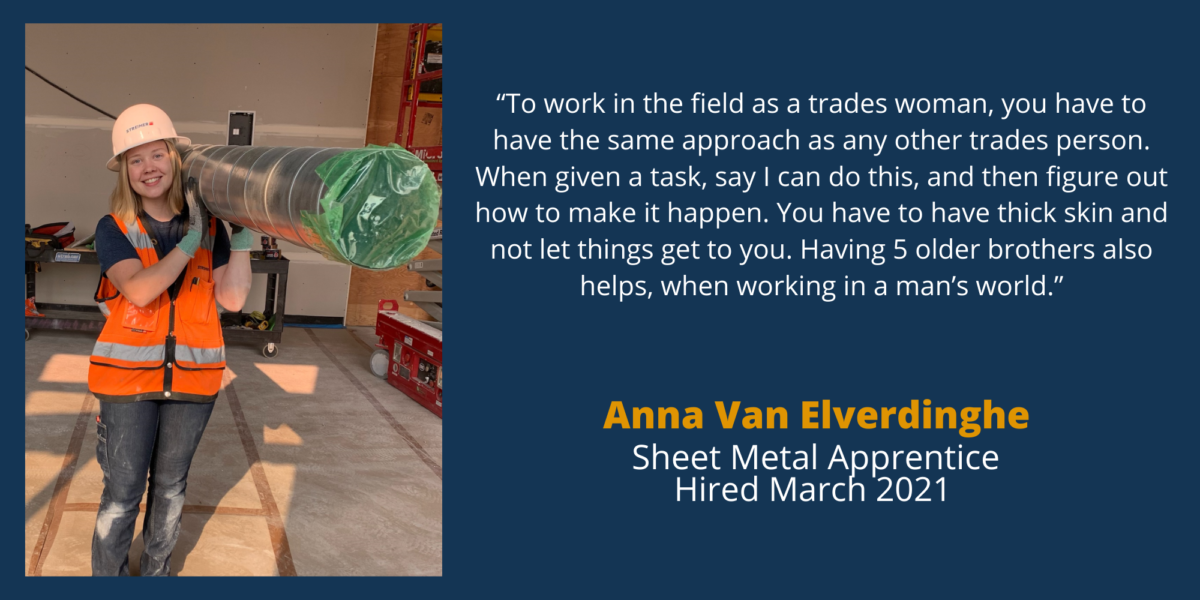
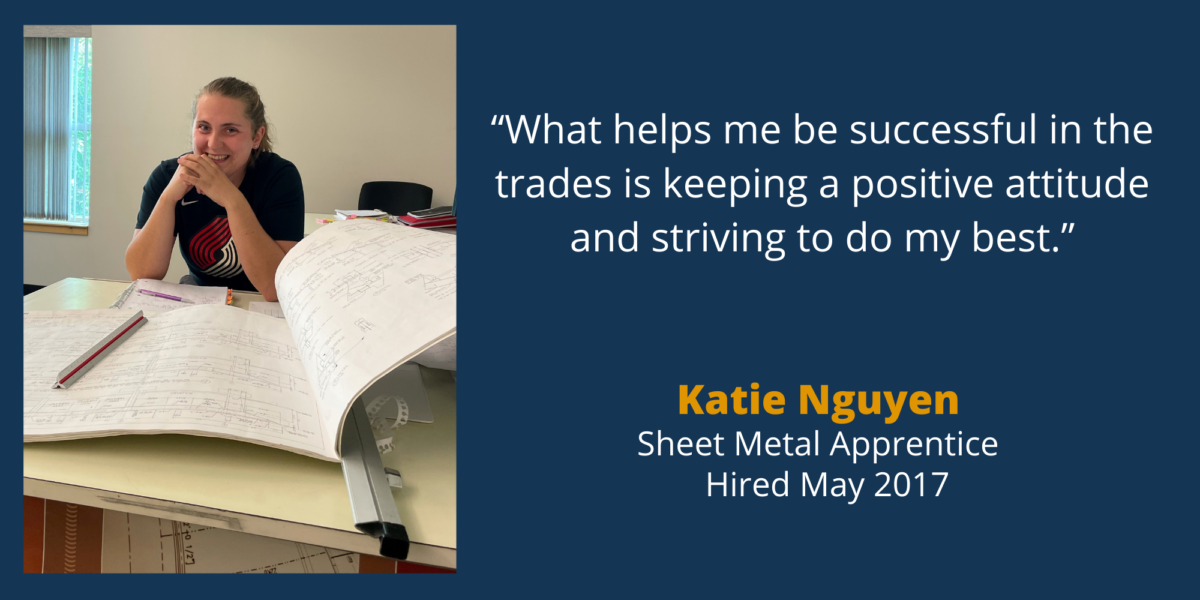
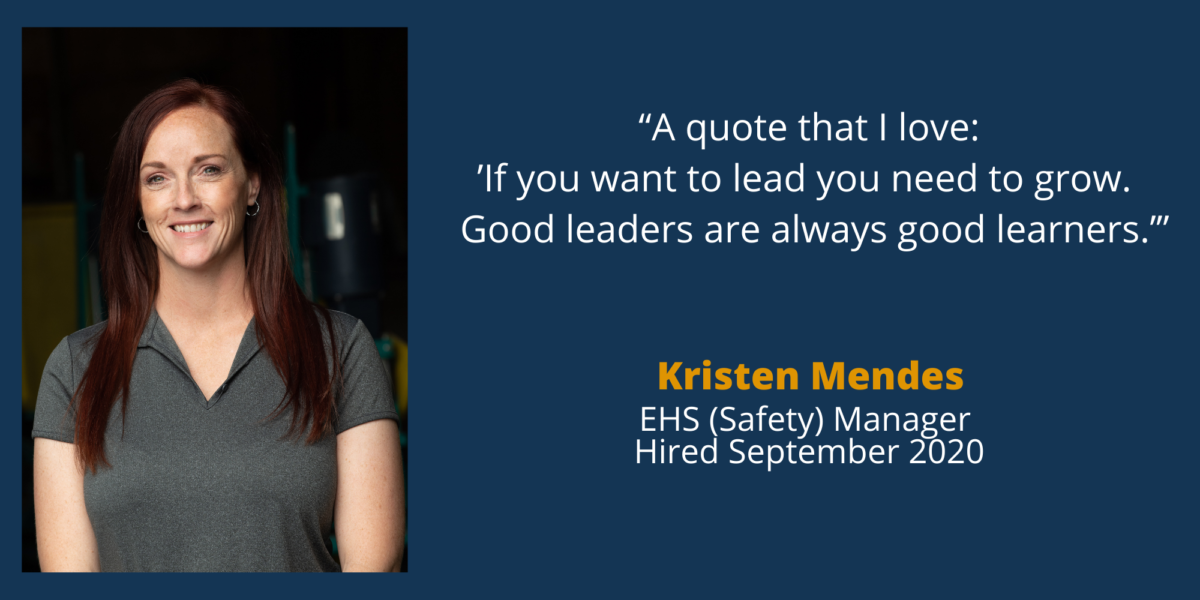
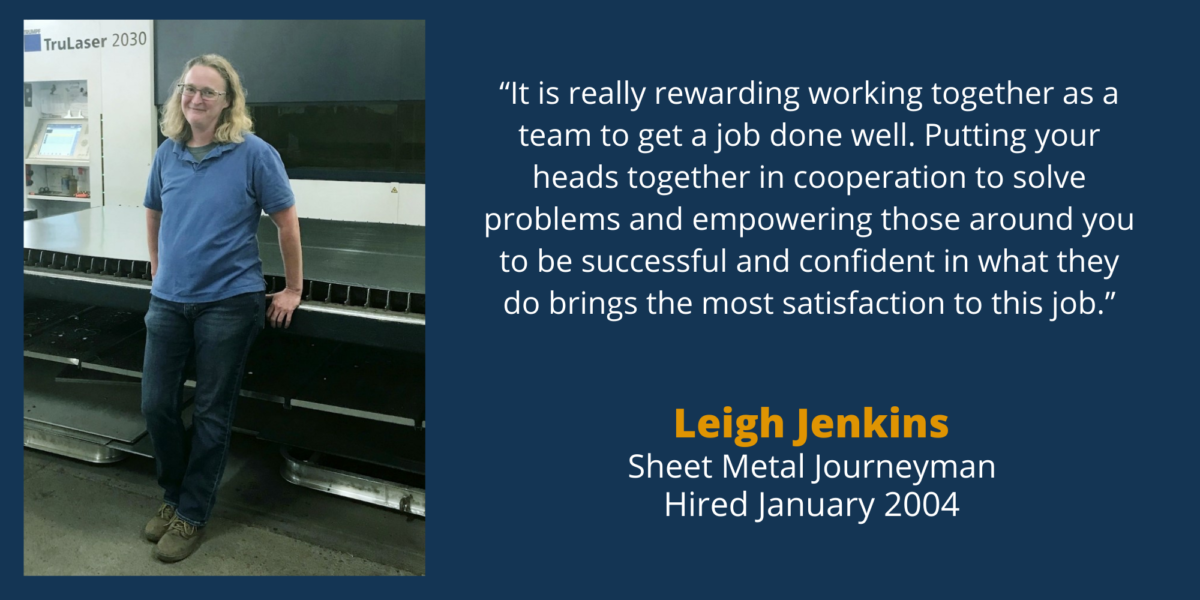
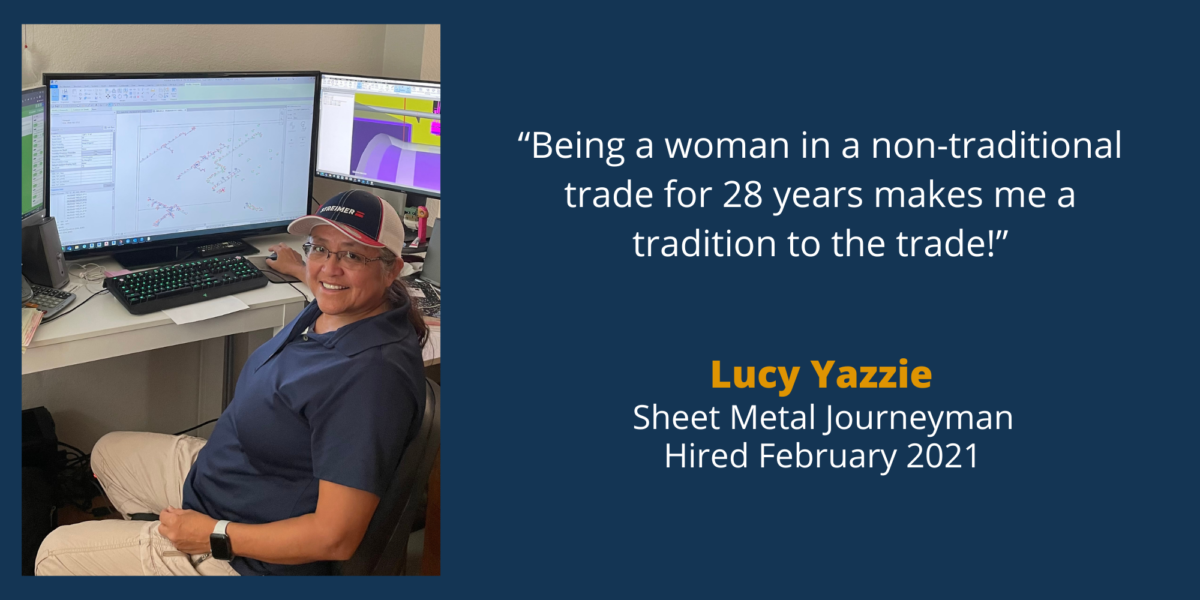
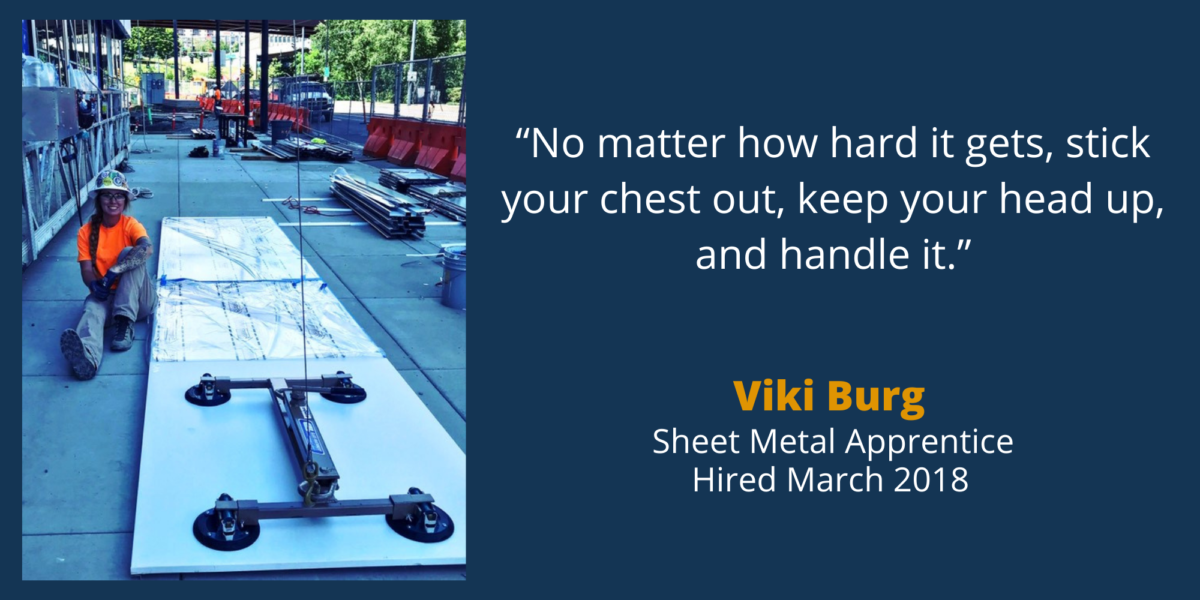
Support for Katie Kutcha’s Son
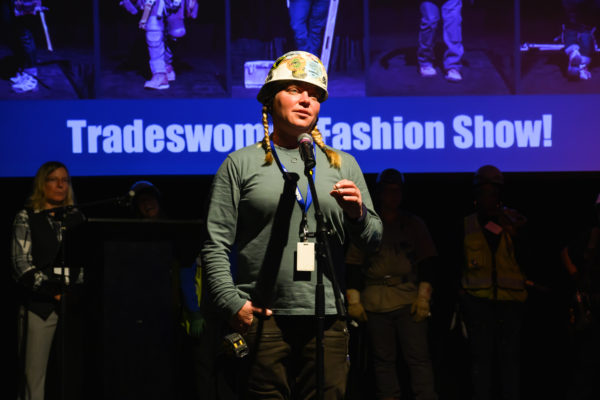
Oregon Tradeswomen is saddened at the loss of our sister Katie Kuchta. Katie was a 2015 OTW TACC graduate, 2017 Woman on the Rise Award Winner, and an incredibly positive force in the Laborer’s family. She will be missed dearly by so many.
Many in our community asked how to best provide support to Katie’s family. Oregon Tradeswomen collected donations to benefit Katie’s son, Stephen, who dreams of going to the Northwest Lineman’s College in Meridian, Idaho.
The direct campaigns have closed, however, if you wish to make a contribution, please contact us.
Liz “Knuckles” Nichols the Cement Mason
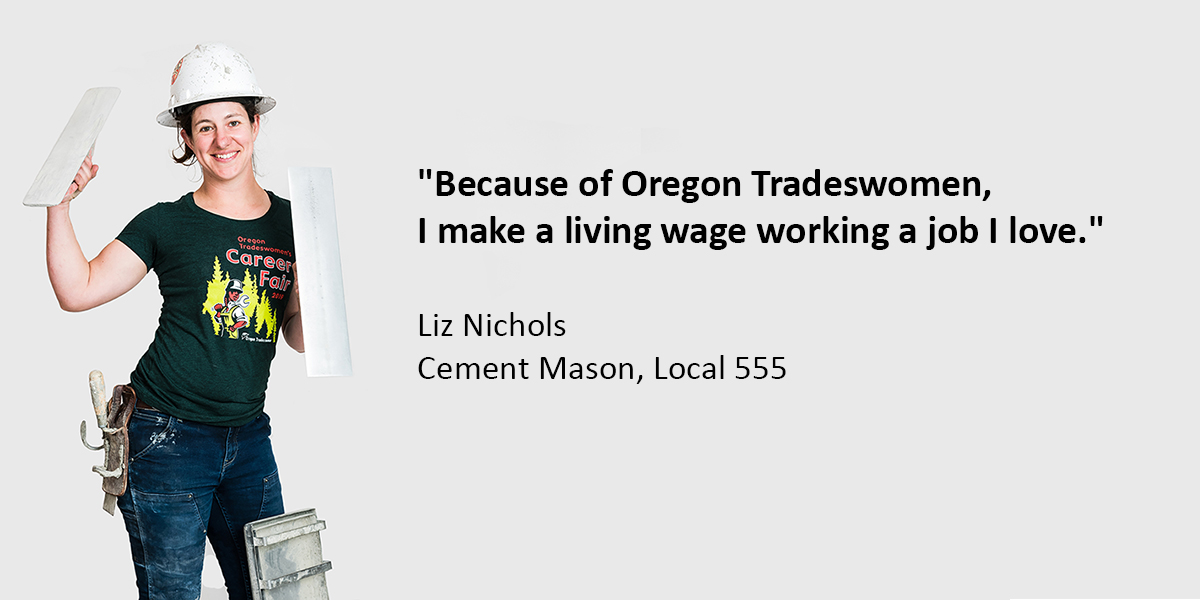
Liz Nichols grew up in Massachusetts, and like so many teenagers, she received the clear message that her next step after high school was to go to college and get a degree.
Liz started college in 2002 and achieving that college degree was no easy feat. College itself was challenging for Liz. She told us, “I was just a mediocre student. I had ADD and a learning disability and getting through college was a struggle.”
But Liz persevered and in 2006, earned her bachelor’s degree in English.
The next steps were not so clear, but the next challenge was in front of her: finding living wage work, paying off college debt, and building her future.
Liz shared that she “had a bit of a crisis of confidence. I got the degree, but it was still a struggle to earn a living wage.” Liz added, “After going through college telling myself, ‘just get through this, and everything will be okay…’ it did a number on my self-esteem because I wasn’t okay – it was still a struggle to earn a living wage.”
Liz moved to Portland and found employment working gardening and landscaping jobs in the spring, summer, and fall, and working at coffee shops in the winter. Her situation was unfortunately common – Liz had her college degree, but was in debt, earning low wages, and receiving no health or retirement benefits at either job.
While working the landscaping jobs, Liz discovered she really enjoyed working outdoors and doing physical work, and it was during a conversation with a customer at the coffee shop in the winter of 2013, when Liz made the connection that she could have the best of both worlds with a career in the trades: living wages and a physical job, not behind a desk. “One day while chatting with an IBEW electrician, I learned about Oregon Tradeswomen’s pre-apprenticeship program. I applied immediately. Liz continued working as a barista until class started. It was meant to be, as Liz almost didn’t get into that class. She said, “I was on the waiting list and lucky for me, someone dropped out!”
Liz loved Oregon Tradeswomen’s pre-apprenticeship class. “I knew immediately I wanted to go the union route.” Liz was drawn to the debt-free career training, the pay, healthcare, retirement benefits, and stability.
Liz said she started TACC with a bit of ’imposter syndrome’, or “who am I to think I can go down this path?” But what she heard from Oregon Tradeswomen instructors throughout the class: “You’re here because you don’t have experience. You will get on the job training and that’s okay – that’s expected.”
Liz started a one-week class with the Cement Masons right after graduating from TACC. On Wednesday after class, Liz was asked to stay late, where she was offered entry into the apprenticeship program starting the following week! She called Oregon Tradeswomen immediately, very excited and slightly unsure. Liz LOVED the work, but wasn’t completely sure she should go for it so quickly? She trusted her instinct and joined Cement Masons Local 555 and is so happy she did.
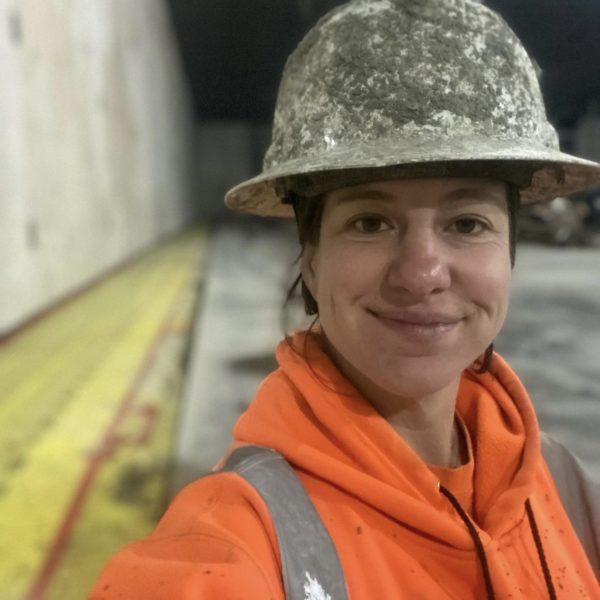
“My Union has been wonderful.” Partway through her apprenticeship, her father-in-law was diagnosed with a terminal illness and Liz and her husband packed up their home in Portland within a week, were moving back to Massachusetts. “It was intense but being in a union saved me!” Liz had virtually no gap in her apprenticeship training – she picked up the next week after arriving in Boston. “There were fewer women on jobsites when I was working in Boston, but I was glad to be able to continue my apprenticeship training without missing a beat”. When she moved back to Portland, it was seamless again.
During much of her last year of apprenticeship, Liz was pregnant, and she worked up to 3 weeks before her due date working concrete! Four months later, Liz was ready to take her journeyman exam. On the scheduled day, she couldn’t secure childcare and brought her young son with her and her instructor and Business Manager babysat while Liz took her journeyman exam! Liz reflected warmly on that day and said, “I felt very supported throughout my apprenticeship there.”
When we asked about any challenges Liz had along the way, Liz shared that most of her male coworkers have been supportive, “there were a few who tried to talk me out of the trade, encouraging me to go to an ‘easier trade’ – to go push a broom or become a flagger.”
Liz also shared that there are not yet any formal structures in place for parental leave – or nursing mothers. “I nursed for 20 months, but there were no facilities on the jobsite, so I was discreetly pumping and dumping breast-milk into a porta-potty. I was still able to nurse son though.”
Today, Liz is loving her work as a journeyman cement mason, and a recent competitor on the CBS television show Tough as Nails! Oregon Tradeswomen was contacted last year by the show’s producers, and we shared the information on social media. Liz told us, “I saw the post on Instagram and went to the website. I filled out the form and sent photos of myself on the job. A few weeks later, I was contacted to participate on the show in LA!”
Liz couldn’t share much about the show, as it was airing at the time of this interview, but she did share that one of the things she loved most was seeing the other undeniably amazing women. “It makes me so happy that the show offers such a physical representation of strong women – increasing visibility in places where there aren’t as many women doing physical work.”
Liz loves the work she does! She told us: “Concrete is like alchemy! It’s challenging work that’s different everyday and I love that you get a final product so immediately. Every time I leave the job site there is something new there that will probably outlast me.”
Social Hour Connections
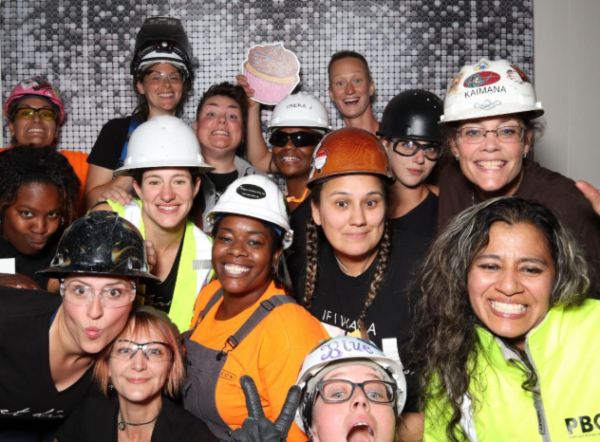
Oregon Tradeswomen has offered Monthly Social Hours for years as a way for tradeswomen to connect with each other and provide educational experiences through topics and guest speakers. As a tradeswoman, it is commonplace to be the only woman on a jobsite, and the opportunity to connect with other women in the trades is such an important aspect for the retention of women in construction careers.
When the COVID-19 pandemic impacted us last year, our Retention Services Coordinator, Kim Neel, knew it was more important than ever to offer a way for tradeswomen to continue to have an opportunity for support and socializing. With that, OTWednesdays was created, a virtual Social Hour taking place on the third Wednesday of every month!
Unlike past Social Hours, OTWednesdays is more of an open format, with no topics or guest speakers, just pure connection between tradesworkers of all ages and experiences. There is something so special about seeing the mentorship between veteran tradeswomen and those who are just getting started on their paths with the sharing of stories, advice on surviving apprenticeship, and tips on how to earn the respect of their male peers. At a recent social hour, we had a tile-setter named Joanne who had been in her trade since the 1980’s who generously answered questions from some upcoming pre-apprenticeship students who were excited about their new careers, but a little nervous about what to expect. From advice on what PPE (personal protective equipment) to invest in to how to approach learning a new tool, the exchange of information was inspiring to witness and it was clear that the novice tradesworkers there took Joanne’s advice to heart.
A unique aspect of our virtual format is that other supporters of tradeswomen can join in to connect and learn. Sometimes industry partners join to provide opportunities to tradeswomen to advance their careers, offering a foot in the door for elevated positions like Construction Inspector or Surveyor. We have even been joined by regional legislators like Sue Chew, Idaho State Representative District 17, who want to learn more about tradeswomen issues as well as provide resources for professional development opportunities. We are grateful for those in our industry and those who are supporters of the tradeswomen movement for their commitment and involvement.
As the pandemic begins to wind down and we look to the future for what is on our horizon, we are evaluating how to best offer support to tradeswomen. While we cannot wait to host Social Hours in our own building, we have seen the value of providing a virtual space for tradeswomen and their supporters to gather and collaborate. Many tradeswomen are tired after a long day of hard work and to have to go home, change out of their work gear, and head out to a social gathering is not always easy. But, to be able to settle in to a comfy chair after work and simply log in to Zoom, the opportunity to socialize is available to a wider community of tradesworkers and their supporters!
The connection between tradeswomen is so valuable, and our goal is to offer easy access to a supportive community that can provide advice and camaraderie. Being a tradeswoman is a unique experience and the hurdles that can come with it can become more manageable when there is a place for others with similar experiences to gather and socialize.
The Hardhats with Heart Initiative

Did you know construction workers are disproportionately affected by heart disease? One in four tradesworkers have high blood pressure, some even being unaware of it before its too late! While construction careers are active jobs, some even say a replacement for the gym, that doesn’t automatically grant tradesworkers a path to great health. After speaking with Lily Banning of the American Heart Association (AHA), we learned there are multiple factors for this heightened risk for heart-attack and stroke for tradesworkers.
Hardhats with Heart is an initiative under the AHA that came to existence when a volunteer, Bart Dickson, President and Founder of Cobalt, spoke up about the frankly unacceptable amount of times he had to make calls to the families of his workers to let them know their loved ones had suffered from a heart attack or stroke on the jobsite. After some investigation, it became clear that there is a direct connection between stress and heart health for tradesworkers with the mental and physical demands of the jobs often being exacerbated by unhealthy coping habits such as poor diet, increased use of energy drinks, use of tobacco products, as well as lack of information about the warning signs of cardiovascular disease.
The AHA is also exploring the role of workplace culture as a contributing factor to overall stress levels and heart health. Jobsites where workers experience harassment and discrimination are hostile work environments which not only negatively impact worker safety, productivity, and retention, but also heart health and overall well-being! These impacts are intensified for women and BIPOC tradesworkers, which is why Oregon Tradeswomen focused on jobsite culture change work: we are an affiliate trainer of RISE Up – a bystander intervention model to prevent bullying and harassment, and part of the work around Safe From Hate which calls on all industry stakeholders in the construction industry to advance diversity, equity, and inclusion by clearly addressing jobsite culture.
With help from construction companies and construction-adjacent organizations like Oregon Tradeswomen, the American Heart Association started Hardhats with Heart in 2017 with three local priorities here in Oregon: Increase access and education about healthy diets, help tradesworkers manage chronic disease, and reduce the high risk of heart disease in tradeswomen. Hardhats with Heart is working hard with the local construction industry to provide jobsite trainings on health and stress-management, offering on-site blood pressure screenings, and creating a virtual Resource Hub for tradesworkers and their employers to learn more about the simple ways they can help prevent heart disease and deaths.
This online Resource Hub is dedicated to health information specific to the construction industry with the intent of being free and easily available. Subjects include nutrition, mental well-being, fitness, managing blood pressure, and more! When we asked the AHA’s Community Impact Director, Lily Banning, about what she wanted our audience to know about these online resources, she told us, “Hardhats with Heart is rolling out a series of industry-wide trainings for free! There is a focus on a different topic for every month starting this July, running through December. We encourage all tradesworkers and their employers to join in on the conversation and get their questions answered!”
Hardhats with Heart looks to continue improving its resources and the services they offer to tradesworkers so that the number of lives lost from preventable disease is reduced. To do this, they want to hear from you! What are you doing to take care of your health? Is there a focus on health, both heart specific and holistically, on your jobsite? What can Hardhats with Heart do for you?
If you are passionate about this issue and want to contribute or want to learn more about how to get involved with Hardhats with Heart, please contact Lily Banning at Lily.Banning@heart.org.
As a community, the goal is to provide free and easy to access free resources to help inspire and equip tradesworkers to live longer, healthier lives.
2021 DJC Building Diversity Awards

- GeoEngineers
- Todd Duwe, Perlo Construction
- Meyer Memorial Trust headquarters project
- Mel Jones, JE Dunn Construction
- Román Hernández, Troutman Pepper
- Kelly Kupcak, Oregon Tradeswomen Inc.
- Wenaha Group
- Portland Building reconstruction project
- RKm Development
- The Skanner (lifetime achievement award)
- Center for Equity & Inclusion
- Advanced Tribal LLC
- Hacienda Community Development Corp.
- Angela Watkins, Minority Construction Group and Constructing Hope
- NAMC University
- Safe from Hate initiative
Happy Retirement, Madelyn!
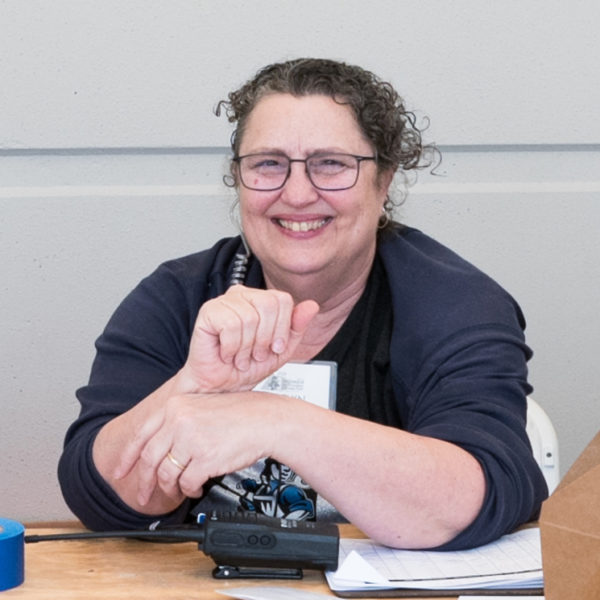
As it happens with many long-range plans, a day once so far away, is suddenly upon us. Oregon Tradeswomen’s CEO and lauded labor activist, Madelyn Elder, is retiring in June!
Madelyn came to Oregon Tradeswomen with firsthand experience of what it’s like to be female in a male dominated industry. She worked for more than 20 years in both Seattle and Portland as a cable splicer before shifting her work to focus on worker justice and financial management. Madelyn served as president of the Communications Workers of America (CW) local 7901 for 15 years. During this time, she also earned her post baccalaureate degree in accounting.
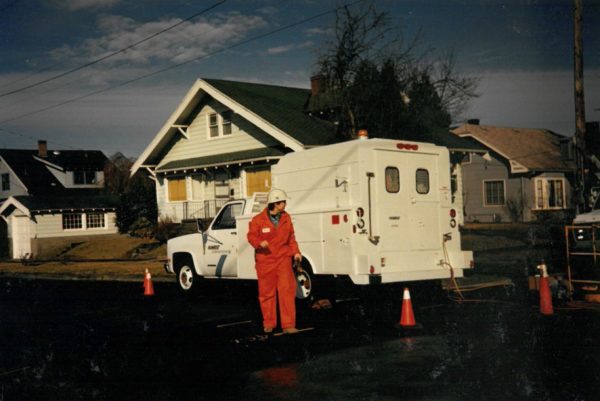
Madelyn retired from CWA in 2014 and joined Oregon Tradeswomen full time as our first Chief Financial Officer. Madelyn’s work and leadership has been invaluable to our growth as an organization, and living our work and mission to ensure equity and dignity in the workplace.
Madelyn’s team will miss her leadership, sass, and joyful laughter. We know she will continue showing up and speaking out for worker justice.
We wish Madelyn all the best in retirement and know that while she will get to spend time with friends, family, and go on many birding adventures, she will continue to raise hell.! Much love to and best wishes to our sister.
With love,
Oregon Tradeswomen
International Worker’s Day 2021

On May 1st, we recognize International Workers Day, also known as May Day, to honor workers and the fight for worker’s rights throughout history. May 1st was chosen to commemorate the 1886 Haymarket Square Massacre in Chicago where, what began as a peaceful rally in support of workers striking for an eight-hour workday, ended in several dead, dozens of wounded, and an aftermath of social unrest.
This fight continues. The month of May marks the anniversary of a heinous crime of hate on a jobsite in downtown Portland where Oregon Tradeswomen graduate and UA Local 290 member Leslie Cotton found a noose on job-site where she was working as an apprentice plumber. Our industry and our community were outraged, and rightfully so, that this blatant act of hate was put on display for all to see, and to serve as a threat to some of the workers on that jobsite.
Since that awful day, our industry and our community have come together to work to put an end to jobsite harassment, collectively working to make construction jobsites safe from hate.
This week, the House Judiciary Committee of the Oregon Legislature is taking up SB 398, which passed the Senate in March. If it passes in the House, the bill would make it a crime to display a noose. There is much more work to do.
While the construction industry provides excellent careers pathways, family-supporting wages, and benefits such as healthcare and pensions, it also has a long history of harassment, hazing, bullying, and discrimination. This unacceptable behavior is most often directed at women and people of color, and for too long, this hostile culture has been permitted to continue.
Oregon Tradeswomen, along with many other industry stakeholders, have long spoken out against discrimination and hate on jobsites and remain committed to changing toxic jobsite culture. Through our participation in the Safe from Hate Alliance, the Metropolitan Alliance for Workforce Equity (MAWE), and in implementing a jobsite culture program called RISE Up (Respect, Inclusion, Safety and Equity), Oregon Tradeswomen is pushing for long-overdue, needed changes to make workplaces safe for all workers.
Our guiding voice for jobsite culture change is the Tradesworker Equity Council (TEC). The TEC is comprised of a diverse group of committed tradesworkers who are part of the Safe from Hate Alliance Steering Committee. Leslie Cotton, the tradesworker who found the noose on their jobsite last May, is a member of this council. She, along with the other Council members and the many tradesworkers in our industry, are the unsung champions in this work. They show up every day not only to do the heavy and hard work of construction, but the equally difficult work of fighting for worker justice and equity.
Oregon Tradeswomen is immensely grateful to the members of the TEC who are the true heroes of this work. Their candor, courage, and tenacity is helping make our industry safe and respectful for all workers.
Thank you for showing up, speaking out and standing up. We are now, and always, humbled, inspired and honored to work alongside you in fighting for justice and equity.
Mary Ann Adkins-Bahena, IUOE Local 701
Janett Arellano, UA Local 290
Leslie Cotton, UA Local 290
Jessica Hendrickson, Heat & Frost Insulators Local 36
Nickeia Hunter, PNW Carpenters Local 1503
Warren T Hunter Jr., UA Local 290
Miranda Jenniches, IUOE Local 701
Jelani McRae, IBEW Local 48
Alejandra Prado, PNW Carpenters Local 1503
Tradeswomen Moms are Superheroes
Being a Mom and a Tradeswoman have more in common than you might think: both jobs are hard work and require patience and commitment.
A construction job site can be a messy place where you have to stay focused even though you’re surrounded by loud noises and distractions. Being a parent means being responsible for showing up on time for appointments, or adjusting to early mornings, similar to the schedule of a construction worker. Raising a child also requires constant attention – which is also a necessary skill when working on a jobsite. Without attention to the details, safety concerns arise and mistakes are made, costing crucial time and money for the project.
Beyond the shared skillsets of working in the trades and being a Mom, the benefits offered by construction careers are just what you need to support a family. Tradesworkers earn high wages, have insurance, retirement plans, pensions, and other benefits – resources that make having a family a little bit easier.
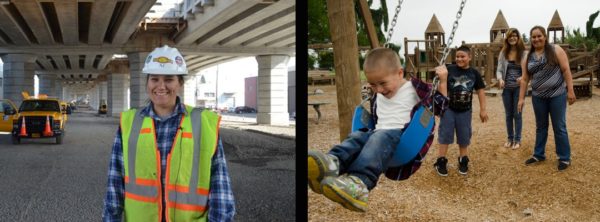
Anjanet “AJ” Banuelos Bolanos, Oregon Tradeswomen graduate, Field Representative at LiUNA Local 737, and mother of three shared with us, “The most extraordinary moment for me was when I closed on my first home by myself. I was only in the union for 3.5 years. No cosigner, no spouse, just my name on the mortgage. I went from sharing a bunk bed with my three kids in my mom’s spare bedroom to homeownership.”
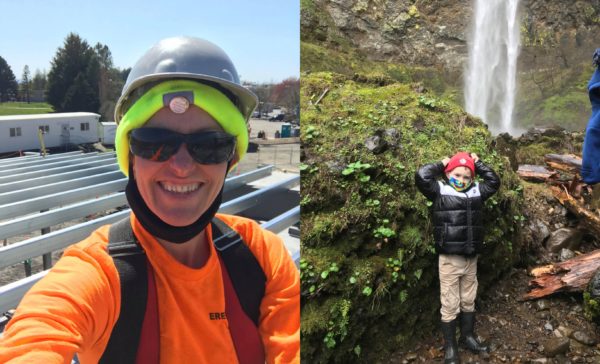
Kara McCrossen, another Oregon Tradeswomen graduate and Ironworker mom shared with us: “The best thing about being a tradeswoman mom is… I’m providing a quality life for my boys and teaching them to appreciate strong women.”
Ultimately, these two jobs are hard work, but the foundation of being a successful tradesperson or mom is love. When things go wrong or you are just exhausted from a long day, love keeps you going and makes the hard days worth it. Beyond the challenges, being a Mom and a Tradeswoman is empowering, exhilarating, and provides a sense of accomplishment from seeing the awesome results of your hard work – whether it’s the bridge you helped build or the child you’re raising.
To all the tradeswoman moms out there, know that you are a superhero. To all the tradeswomen who want to be moms or moms who want to start a career in the trades, know that you can do both. Just remember not to give up on your dreams, and know that Oregon Tradeswomen has your back!
Happy Mothers Day!